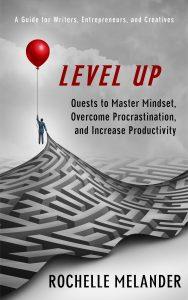Develop a Writing Habit
May 9, 2023
Note From Rochelle
Dear writers,
I’ve been talking to clients and friends and hearing you say things like, “When is the next accountability group?” So many of you were disappointed that the next group didn’t start until fall, that I decided to host a special Writing Accountability Group in June. We’ll meet every Thursday at 11:00 AM (CT). During those five sessions, you will get a chance to commit to a goal and check in with your team every week. I’ll teach you tools to establish a writing habit, overcome distractions, ditch writer’s block, and write.
 Speaking of writing habits, today’s tip will help you use the habit loop to establish a writing practice. The tip is adapted from my book, Level Up. If you’re interested in using the book to master your mindset and more, the Kindle edition is just $2.99 right now.
Speaking of writing habits, today’s tip will help you use the habit loop to establish a writing practice. The tip is adapted from my book, Level Up. If you’re interested in using the book to master your mindset and more, the Kindle edition is just $2.99 right now.
Happy writing,
Rochelle, the Write Now! Coach
Develop a Writing Habit
By Rochelle Melander
First forget inspiration. Habit is more dependable. Habit will sustain you whether you’re inspired or not. Habit will help you finish and polish your stories. Inspiration won’t. Habit is persistence in practice.
– Octavia E. Butler
Wannabe writers tend to depend on inspiration to cue them to write. Unfortunately, inspiration comes most frequently while we are writing and not before. Many famous writers talked about the power of making writing a habit. In the quote above, science fiction writer Octavia Butler reminded her readers that habit sustains us long after inspiration has disappeared. When novelist Haruki Murakami is writing a book, he sticks to a strict schedule of rising early, writing for 5-6 hours, and then going for a run.
Flannery O’Connor also believed in the habit of writing, saying: “I’m a full-time believer in writing habits… Of course you have to make your habits in this conform to what you can do. I write only about two hours every day because that’s all the energy I have, but I don’t let anything interfere with those two hours, at the same time and the same place.”
In his book, The Power of Habit, Charles Duhigg gave the concept of habit a structure with three distinct steps: cue, practice, reward.” This habit loop might be as simple as brushing your teeth:
Cue: It’s bedtime.
Practice: Brush teeth
Reward: Ohhh! My mouth feels fresh and clean.
As writers, we can adopt the habit loop and use it as a tool to make our own writing a habit. When we do that, it increases our productivity. In this quest, you will determine your cue, practice, and reward and then put it into place.
The Quest
Find a Cue
When J. K. Rowling was writing the first Harry Potter book, the minute her daughter fell asleep (cue), she’d take off for the café and write (habit). Keith Donahue, author of The Stolen Child and Angels of Destruction, wrote both novels by hand on his subway commute to and from work. His cue was getting on the train. I’ve nurtured my writing habit by creating a morning ritual. Before I check Facebook or email, I look at my writing task of the day, written on my bullet journal next to my computer, and write. Once I’ve put in my writing time, I reward myself with a trip to Facebook or a walk around the block.
Your turn: Reflect on your most recent successful writing sessions. Is there a cue lurking in there? Is there something you routinely do that could be your cue, like taking a morning walk or having an afternoon snack?
Design Your Practice
Know when, where, and what you will create. If you are writing and fear the blank page, do a prewriting exercise, like mind mapping or brainstorming so that you don’t have to face a blank page. If you need research materials like books or special supplies, gather them together before your work session.
Plan Your Reward
For many writers, the feeling of having written is a reward in itself. Whew! But if that’s not quite enough for you, one way to keep your butt in the chair is to promise yourself a delicious reward. Famous writers have rewarded themselves in unique ways: Anthony Burgess used the Martini Method. When he had completed his word count, he would relax with a dry martini and enjoy the rest of the day with an easy conscience, and normally in a bar. Charles Dickins would head out for a walk, hoping to collect images for his next story. Kurt Vonnegut went for a swim. And, as you know, Haruki Murakami, runs. Choose a reward that brings you joy!
Game Play Tips
- Mine the past to discover what cues and rewards you used during your most productive writing sessions.
- If you have difficulty finding a cue that works, piggyback on an existing habit, the tasks you do every day or week. Even when you’re swamped with work or overwhelmed with tasks, you do a few things every single day: get up, brush your teeth, eat breakfast, check email, take a snack break, go to bed. You also do a few things every week at the same time: go to yoga class, pick up kids from school, or visit a family member in the nursing home. Take one of these constants and attach writing to it, either before or after.
- Review and revise. Try out a cue, practice, and reward for the next few writing sessions. At the end of each session, note what worked and what didn’t. After several sessions with a single cue, review your practice and revise anything that isn’t working well.
For the Win
We don’t need elaborate cues or rewards to get to our creative projects and complete them. And once we know what cues work for us and practice honoring them, we’ll be well on our way to creating a writing habit, which is the best way to increase productivity and finish projects!















